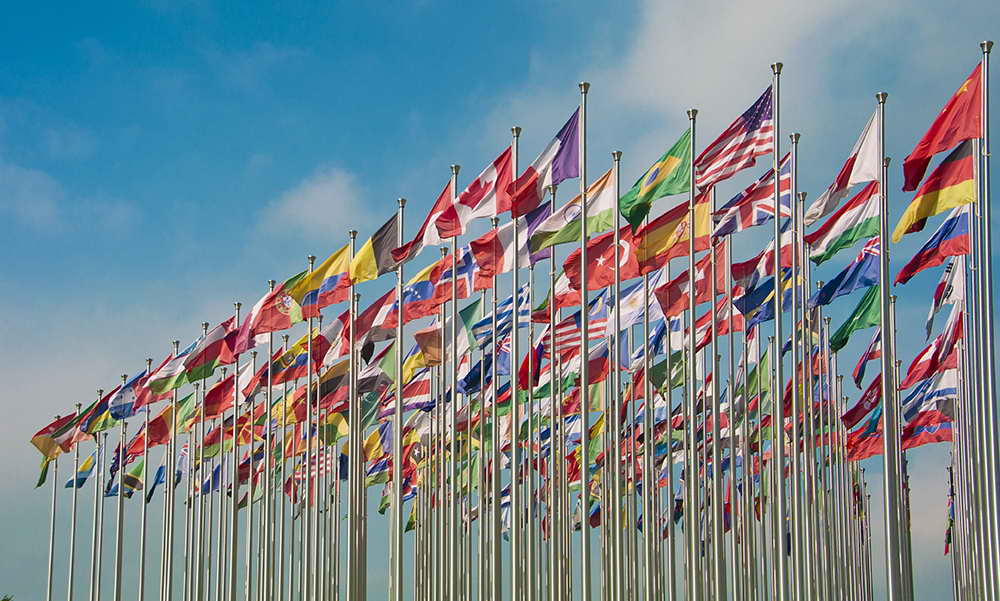September 22, 2017
9/22: Is America Still the Leader of the Free World?
Third Rail with Ozy/Marist National Poll
Many Americans think the United States is still the leader of the free world, but most do not perceive the global prominence of the United States to be growing, according to an Exclusive Third Rail with OZY-Marist Poll, commissioned by WGBH Boston and OZY Media for the new PBS prime-time, cross-platform debate program Third Rail with OZY. Americans also exhibit lackluster confidence in the United States’ ability to continue to be a leader in world affairs, marking a notable shift in public opinion over the last four decades.
The national survey was conducted by The Marist Poll in advance of this week’s Third Rail with OZY episode, which asks “Should America Be the World’s Cop?,” airing Friday, September 22, 2017 at 8:30pm ET (check local listings) and streaming on pbs.org/thirdrail. Third Rail with OZY, hosted by Emmy Award-winning journalist Carlos Watson, is a seven-part cross-platform series. Each week, expert and celebrity guests engage with Watson to debate a timely, provocative topic, incorporating audience and social media input and exclusive national polls.
Although more than two-thirds of Americans (67%) consider the United States to still be the leader of the free world, only 20% of residents nationally—down from 31% in a 1978 ABC News/Harris Survey—think the United States plays a more important role as a world leader. Nearly four in 10 adults (37%) believe the United States’ role on the world stage is less important than it was a decade ago; 39% assert the nation functions in just as important a role as it has.
Partisan differences are present in both findings. While 86% of Republicans and 72% of independents say the United States remains the leader of the free world, only half of Democrats (50%) agree. Forty-four percent of Democrats think the United States has lost its leadership position on the world stage and 6% are unsure.
Democrats (53%) are also more likely than Republicans (23%) and Independents (38%) to consider the United States to be less important globally than it was ten years ago. However, Republicans and Independents do not perceive the United States to be exerting greater global influence. Pluralities of Republicans (42%) and Independents (45%) say the United States’ role is neither more nor less prominent internationally than it previously was.
Americans’ confidence in the United States’ ability to continue to be a leader in world affairs is waning. Thirty-seven percent of U.S. adults, down from 49% in a 1983 Roper Report, are very confident that the nation will remain in the fore of international leadership. Forty-four percent are only fairly confident that the United States will retain its leadership status, and 18% are not at all confident. Again, opinion splinters along party lines. Sixty-two percent of Republicans report they are very confident in the United States to be a global leader while pluralities of Democrats (49%) and Independents (47%) say they are only fairly confident in America’s ability to do so.
“The world is at America’s doorstep this week, as 140 international heads of state gather at the U.N.,” says Denise DiIanni, series creator and Executive-in-Charge of Third Rail with OZY. “With conflicts across the globe and natural disasters at our borders, what is our nation’s role in the world? On Third Rail tomorrow, we’ll debate this very timely question, ‘Should America Be the World’s Cop?’”
Americans’ support for the United Nations is nearly as strong as it was fifty years ago. Seventy-five percent of residents nationally, compared with 81% in a 1967 Harris Survey, believe the U.N. is worthwhile while 18% do not. Seven percent are unsure. Most Democrats (88%) and Independents (82%) value the U.N. Fewer Republicans (59%) agree. Americans under 45 years of age (83%) are more likely than older residents (69%) to think the United Nations is a worthwhile organization.
A majority of Americans doubt President Donald Trump’s ability to do the right thing regarding world affairs. Fifty-six percent don’t have very much confidence (21%) or have no confidence at all (35%) in the president’s ability on the world stage. In contrast, during President Barack Obama’s first term in office, 74% of U.S. residents, according to a 2009 Pew Global Attitudes Project Poll, had a lot (48%) or some confidence (26%) in the former president to do the right thing in the realm of foreign affairs. Forty-four percent of Americans currently say they have a lot of confidence (23%) or some confidence (21%) in President Trump to do what is best for Americans internationally. By more than four to one, Republicans (84%) are more likely than Democrats (18%) to have, at least, some confidence in President Trump to do the right thing in world affairs.
More than six in ten Americans (62%) say President Donald Trump makes them feel less safe about what is happening in the world. Thirty-two percent say the president makes them feel safer, and 6% are unsure. Of note, while 66% of Republicans say the president makes them feel safer, a notable 26% report they feel less secure about world events under the Trump administration.
For more on Third Rail with OZY:
#ThirdRailPBS
For more on The Marist Poll:
#MaristPoll
Complete September 22, 2017 Exclusive Third Rail w/OZY-Marist Poll Release
Complete September 22, 2017 Exclusive Third Rail w/OZY-Marist Poll Results and Methods

